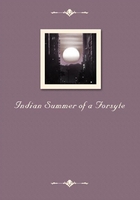
第37章
NO-LONGER-YOUNG JOLYON AT HOME
Trees take little account of time,and the old oak on the upper lawn at Robin Hill looked no day older than when Bosinney sprawled under it and said to Soames:"Forsyte,I've found the very place for your house."Since then Swithin had dreamed,and old Jolyon died,beneath its branches.And now,close to the swing,no-longer-young Jolyon often painted there.Of all spots in the world it was perhaps the most sacred to him,for he had loved his father.
Contemplating its great girth--crinkled and a little mossed,but not yet hollow--he would speculate on the passage of time.That tree had seen,perhaps,all real English history;it dated,he shouldn't wonder,from the days of Elizabeth at least.His own fifty years were as nothing to its wood.When the house behind it,which he now owned,was three hundred years of age instead of twelve,that tree might still be standing there,vast and hollow--for who would commit such sacrilege as to cut it down?A Forsyte might perhaps still be living in that house,to guard it jealously.
And Jolyon would wonder what the house would look like coated with such age.Wistaria was already about its walls--the new look had gone.Would its hold its own and keep the dignity Bosinney had bestowed on it,or would the giant London have lapped it round and made it into an asylum in the midst of a jerry-built wilderness?
Often,within and without of it,he was persuaded that Bosinney had been moved by the spirit when he built.He had put his heart into that house,indeed!It might even become one of the 'homes of England'--a rare achievement for a house in these degenerate days of building.And the aesthetic spirit,moving hand in hand with his Forsyte sense of possessive continuity,dwelt with pride and pleasure on his ownership thereof.There was the smack of reverence and ancestor-worship (if only for one ancestor)in his desire to hand this house down to his son and his son's son.His father had loved the house,had loved the view,the grounds,that tree;his last years had been happy there,and no one had lived there before him.These last eleven years at Robin Hill had formed in Jolyon's life as a painter,the important period of success.He was now in the very van of water-colour art,hanging on the line everywhere.His drawings fetched high prices.Specialising in that one medium with the tenacity of his breed,he had 'arrived'--rather late,but not too late for a member of the family which made a point of living for ever.His art had really deepened and improved.In conformity with his position he had grown a short fair beard,which was just beginning to grizzle,and hid his Forsyte chin;his brown face had lost the warped expression of his ostracised period--he looked,if anything,younger.The loss of his wife in 1894had been one of those domestic tragedies which turn out in the end for the good of all.He had,indeed,loved her to the last,for his was an affectionate spirit,but she had become increasingly difficult:jealous of her step-daughter June,jealous even of her own little daughter Holly,and making ceaseless plaint that he could not love her,ill as she was,and 'useless to everyone,and better dead.'He had mourned her sincerely,but his face had looked younger since she died.If she could only have believed that she made him happy,how much happier would the twenty years of their companionship have been!
June had never really got on well with her who had reprehensibly taken her own mother's place;and ever since old Jolyon died she had been established in a sort of studio in London.But she had come back to Robin Hill on her stepmother's death,and gathered the reins there into her small decided hands.Jolly was then at Harrow;Holly still learning from Mademoiselle Beauce.There had been nothing to keep Jolyon at home,and he had removed his grief and his paint-box abroad.There he had wandered,for the most part in Brittany,and at last had fetched up in Paris.He had stayed there several months,and come back with the younger face and the short fair beard.Essentially a man who merely lodged in any house,it had suited him perfectly that June should reign at Robin Hill,so that he was free to go off with his easel where and when he liked.She was inclined,it is true,to regard the house rather as an asylum for her proteges!but his own outcast days had filled Jolyon for ever with sympathy towards an outcast,and June's 'lame ducks'about the place did not annoy him.By all means let her have them down--and feed them up;and though his slightly cynical humour perceived that they ministered to his daughter's love of domination as well as moved her warm heart,he never ceased to admire her for having so many ducks.He fell,indeed,year by year into a more and more detached and brotherly attitude towards his own son and daughters,treating them with a sort of whimsical equality.When he went down to Harrow to see Jolly,he never quite knew which of them was the elder,and would sit eating cherries with him out of one paper bag,with an affectionate and ironical smile twisting up an eyebrow and curling his lips a little.And he was always careful to have money in his pocket,and to be modish in his dress,so that his son need not blush for him.They were perfect friends,but never seemed to have occasion for verbal confidences,both having the competitive self-consciousness of Forsytes.They knew they would stand by each other in scrapes,but there was no need to talk about it.Jolyon had a striking horror--partly original sin,but partly the result of his early immorality--of the moral attitude.The most he could ever have said to his son would have been:"Look here,old man;don't forget you're a gentleman,"and then have wondered whimsically whether that was not a snobbish sentiment.The great cricket match was perhaps the most searching and awkward time they annually went through together,for Jolyon had been at Eton.They would be particularly careful during that match,continually saying: